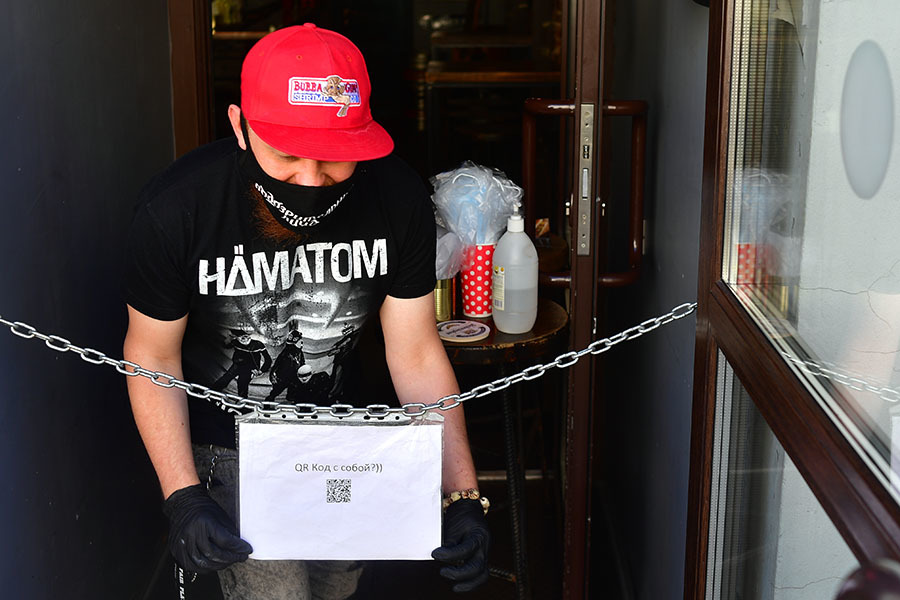The main department of the Ministry of Internal Affairs of Russia in Moscow opened a criminal investigation in connection with the purchase of a fake QR code by a citizen.
This was announced by Pavel Milovanov, head of the department for organizing the inquiry of the Main Directorate of the Ministry of Internal Affairs in Moscow.
“Yesterday we opened a criminal case under Part 1 of Art.
159 of the Criminal Code of the Russian Federation (“Fraud”) on the fact of acquiring a non-existent QR code, ”Milovanov said at a press conference at Izvestia MIC.
At the same time, 55 criminal cases have been initiated in the Russian capital for counterfeiting certificates for coronavirus infection and PCR tests.
“As of yesterday, we initiated 55 criminal cases of this category ... In 32 criminal cases, the subjects of crimes were certificates of vaccination against COVID-19, 16 - certificates of the results of PCR tests, nine - certificates of medical withdrawal from vaccination and one - about the lack of contacts with infectious patients, "- explained the head of the department for the organization of inquiry of the Main Directorate of the Ministry of Internal Affairs in Moscow.
At the same time, law enforcement officers completed an inquiry on six criminal cases, they were sent to court, two of them have already been considered.
Also on russian.rt.com "Triple risk": why buying fake coronavirus vaccination certificates is dangerous
Pavel Milovanov stressed that the main task of the Ministry of Internal Affairs is to identify the full chain of such crimes: from the production of forged documents to buyers.
“The goal is not to initiate as many criminal cases as possible, but to establish a complete chain from the moment these certificates are issued to the direct sale and purchase of them by citizens,” he said.
Also on July 8, the press service of the capital's headquarters of the Ministry of Internal Affairs said that a citizen who contacted an unknown person on the Internet, who promised to provide a QR code, contacted the police.
He estimated his services at 9 thousand rubles.
As a result, the citizen transferred the indicated amount to the attacker's bank account, but never received the service.
"Currently, police officers are carrying out activities aimed at identifying and arresting the attacker," the message says.
On July 7, the official representative of the Ministry of Internal Affairs of Russia, Irina Volk, reported that employees of the Department of Economic Security and Anti-Corruption of the Internal Affairs Directorate in the Central Administrative District of the Moscow Main Directorate of the Ministry of Internal Affairs detained a courier woman who was delivering a fake COVID-19 vaccination certificate to the customer.
It is noted that this document was purchased on the Internet for 3800 rubles.
After that, the operatives conducted a search in one of the organizations in the center of Moscow, where they found 20 more envelopes with forgeries.
RIA News
© Alexey Maishev
“Employees of the Department of Inquiry of the Internal Affairs Directorate for the Central Administrative District of the Main Directorate of the Ministry of Internal Affairs of Russia in Moscow have initiated criminal cases on the grounds of a crime provided for in Part 1 of Article 327 of the Criminal Code of the Russian Federation.
Operational-search measures are being taken to identify all episodes of document forgery, their sale and use, ”explained an official representative of the Ministry of Internal Affairs of Russia.
As a reminder, according to the decree of the Mayor of Moscow Sergey Sobyanin, from June 28, it is possible to get to the capital's catering establishments only with the help of a special QR code.
To receive a QR code, a citizen must be vaccinated against coronavirus, have had COVID-19 in the last six months, or have a negative PCR test no older than three days.
At the same time, the restrictions did not apply to summer verandas - you do not need a QR code to visit them.
On Thursday, July 8, Sergei Sobyanin announced the extension of this measure until August 1, inclusive, against the backdrop of a gradual stabilization of the epidemiological situation in Moscow.
“This decision will support both restaurants and the tourism industry in general, and just Muscovites who have not yet completed vaccination,” the mayor said.
According to the vice-president of the Federation of restaurateurs and hoteliers of Russia, the ombudsman for the Moscow restaurant business, Sergei Mironov, such a decision of the capital's authorities will give the industry a chance to hold out in a difficult period.
“Let's see what will happen in the area of July 25, closer to this date (August 1 -
RT
), we'll see the filling of restaurants, and then we will draw final conclusions. We still start from the real filling of restaurants, but now everyone is sitting on the verandas, there is no one inside, "RIA Novosti quotes him.

